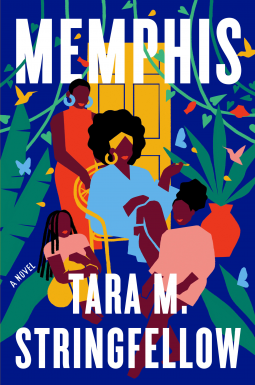Tara M. Stringfellow’s Memphis: A Book Review By: Paloma Lenz

 Three generations of Black women are the focus of Tara M. Stringfellow’s debut novel, Memphis.
Three generations of Black women are the focus of Tara M. Stringfellow’s debut novel, Memphis.
Miriam arrives at her ancestral home with her daughters Joan and Mya in tow. Greeted by her towering younger sister, August, Miriam finds solace in the Victorian-style house her father built for their mother, Hazel. The story of each generation of women is told in shifting perspectives, bouncing back and forth through time, illuminating the shared and generational trauma inherited and endured by each of the women.
With the skill of a poet, Stringfellow uses her mastery of language to describe everyday scenes with profound detail, transporting readers into the minds and hearts of the women she’s created.
Miriam meets her future husband Jax in a record store, and she’s captivated by him. “She had never seen anyone that dark,” Stringfellow writes. “He was the color of a lonely street in the middle of the night.” Miriam is described as having only ever regarded men as “inevitable oddities and annoyances, nothing more than mosquito bites in the summer, moths that made their way into chests in the winter months, the dust that settled atop books.” Still, she couldn’t keep her heart from leading her into the fire when it came to Jax.
And leap into the fire they did. To the dismay of August and the hesitation of their mother, Miriam married Jax after a very brief courtship and followed him to Camp Lejeune. But, unfortunately, Jax’s violent temper plagues their love, bringing Miriam and her girls back to August’s doorstep years later.
Men play a decisive role in the lives of North women. Myron, August and Miriam’s father, swept their mother Hazel off her feet, wrapping her in love and building their family home. But days after becoming the first Black detective in Memphis, he is found dead. The white officers who arrive at Hazel’s door can’t hold back their amusement at her rage and despair, and she dedicates the rest of her life to activism, for better or for worse.
August’s son Derek was abused by his father. Unfortunately, the trauma of his mistreatment manifests in sexual violence against his younger cousin Joan and an eventual double murder that sends him to prison. Joan’s rape is a burden she carries and a weight that hangs among the North women. But Joan also has a gift that could set her free.
The North women push to make their way in the world and leave the shadow of racial and sexual trauma behind them. Miriam becomes the nurse she wanted to be before she met Jax. Joan never stops drawing and nurtures her gift thanks to the captivating neighbor Miss Dawn. Joan celebrates the women of her neighborhood and uses them as part of her portfolio for a fellowship.
Joan, with the help of the women around her, finds freedom. “I knew it now. Freedom. And it tasted just like one of Mama’s warm blackberry cobblers.” The release from trauma, to tell her own story, and the freedom to move forward of her own accord.



